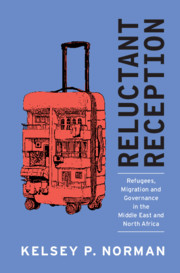Book contents
- Reluctant Reception
- Reluctant Reception
- Copyright page
- Dedication
- Epigraph
- Contents
- Figures
- Tables
- Acronyms
- Note on Translation
- Preface
- 1 Introduction
- 2 Host State Engagement in the Middle East and North Africa
- 3 Egypt
- 4 Morocco
- 5 Turkey
- 6 Differential Treatment by Nationality?
- 7 The Domestic Influence of International Actors
- 8 The Post-2015 Migration Paradigm in the Mediterranean
- 9 Conclusion and Avenues Forward
- Book part
- Notes
- References
- Index
2 - Host State Engagement in the Middle East and North Africa
Published online by Cambridge University Press: 26 November 2020
- Reluctant Reception
- Reluctant Reception
- Copyright page
- Dedication
- Epigraph
- Contents
- Figures
- Tables
- Acronyms
- Note on Translation
- Preface
- 1 Introduction
- 2 Host State Engagement in the Middle East and North Africa
- 3 Egypt
- 4 Morocco
- 5 Turkey
- 6 Differential Treatment by Nationality?
- 7 The Domestic Influence of International Actors
- 8 The Post-2015 Migration Paradigm in the Mediterranean
- 9 Conclusion and Avenues Forward
- Book part
- Notes
- References
- Index
Summary
Chapter 2 elaborates the three-pronged argument of this book. First, classifications in the existing literature tend to describe engagement in a dichotomous manner—states are either inclusionary or exclusionary toward migrants and refugees—leaving no room for the possibility of state indifference as a policy choice by itself. Instead, this book argues that host states have three affirmative policy options: liberalism, repression, and indifference. A policy of indifference means that a host state refrains from directly engaging with or providing services to migrants and refugees and instead relies on international organizations and NGOs to carry out engagement on its behalf, which has tangential benefits for the host state. Second, while state capacity is one factor that should be considered in seeking to understand state decision making, geostrategic imperatives and international perceptions drive engagement decisions at least as much as the capacity of each host state. Third, when indifference becomes an untenable strategy a state will adopt a more liberal engagement policy in order to avoid international shaming or if there are diplomatic or economic benefits from doing so, or may turn to a repressive policy if migrant and refugee groups are deemed a security threat.
- Type
- Chapter
- Information
- Reluctant ReceptionRefugees, Migration and Governance in the Middle East and North Africa, pp. 21 - 42Publisher: Cambridge University PressPrint publication year: 2020

